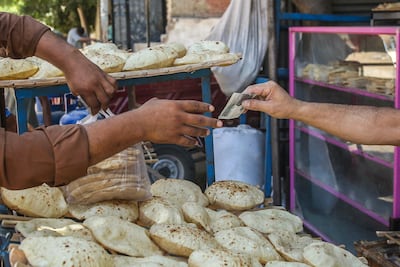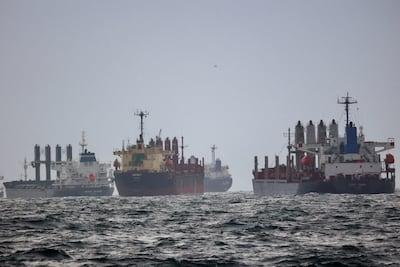Russia has repeatedly claimed that western sanctions are negatively affecting its agricultural exports in an effort to possibly block the renewal of a crucial grain deal next week, but data provided to The National suggest an overall increase in Russian fertiliser and wheat exports in 2022.
This does not mean that the sanctions, which have not been imposed on agricultural products or fertilisers, have not affected Russian exports, said Joseph Glauber, senior research fellow at food security think tank IFPRI and former chief economist at the US Department of Agriculture.
Because of the opacity of Russia's export figures, there is simply not enough public data to jump to such conclusions.
By escalating threats shortly before the grain deal's renewal date on March 18, Russia might be hoping to renegotiate the deal on more favourable terms. Moscow made similar statements before the last renewal in November but agreed to it anyway.
“There’s been a lot of popular support among developing countries for this deal. I think there will be a lot of pressure for it to be extended,” Mr Glauber told The National.
The Black Sea grain initiative was brokered by the UN and Turkey in July to prevent a global food crisis by allowing Ukrainian grain, blockaded during Russia’s invasion, to be safely exported from three ports. Russia and Ukraine are among the world’s largest grain and fertiliser exporters.
Russia has claimed that western sanctions have affected payments, shipping and insurance and therefore pose a “barrier” to its grain and fertiliser exports.
In November, the UN intervened to unlock the transit of a fertiliser shipment stuck for months in Rotterdam because its owner was a sanctioned Russian individual, despite the fertiliser itself not being listed.
lead EU Commission spokesman on foreign affairs
A few weeks later, the EU introduced a derogation allowing the bloc’s 27 countries to authorise transactions on food and fertilisers with sanctioned individuals who held a significant role in international trade in agricultural and food products before their listing.
A package deal
Russian Foreign Minister Sergey Lavrov told a news conference on Thursday that what he called the “two parts” of the Black Sea grain initiative — ensuring safe export of Ukrainian grain and removing barriers to Russian exports — were “inextricably linked”.
“The first part is being implemented, and we are fulfilling all our obligations in this regard together with our Turkish colleagues,” Mr Lavrov said. “The second part is not being implemented at all.
“If we're talking about a deal, it's a package deal. You can only extend what is already being implemented, and if the package is half-implemented, then the issue of extension becomes quite complicated.”
The EU Commission’s lead spokesman for foreign affairs, Peter Stano, told The National that such claims are “plainly wrong”.
“The European Commission has made it clear in its guidance that the transfer of Russian fertilisers and animal feed to third countries, as well as the financing or financial assistance related to such transfer by EU operators or via EU territory is permitted,” he said.
Mr Stano said the EU supports the renewal of the grain deal as a “crucial factor to keep the stability of prices and allow continuous flow of grains for humanitarian purposes”.
Claims regarding the impact of western sanctions on Russian exports are difficult to verify as Russia stopped sharing its export figures at the start of the war in February last year.

Experts and UN agencies such as the Food and Agriculture Organisation have to piece together reported imports from Russia’s trading partners to estimate how much the country is exporting, a process called mirror trading.
Using this technique, Mr Glauber has gathered data that show that, with some exceptions, Russian exports of wheat and some fertilisers increased in 2022 despite these alleged “barriers”.
Benefiting from a large crop in 2022, Russian wheat exports increased by 11 per cent in 2022. Figures during the first months of the war were lower than usual but picked up again when it started exporting wheat harvested in June and July.
Countries such as Turkey, Egypt and Kazakhstan were big buyers of Russian wheat, with Kazakhstan importing 45 per cent more than in 2021, he added.
Russia’s shares in Egyptian wheat imports soared this year, at 1.49 million tonnes out of a total quantity of about 1.67 million tonnes in January and February 2023, the FAO’s markets and trade division reported.
Record-high wheat exports
“[The] Russian Federation was always an important exporter of wheat to Egypt but the shares were not this high,” the FAO told The National.
The agency estimates that Russia’s wheat and barley output reached record levels in 2022 thanks to large plantings and above-average rainfall. Exports are projected to be 18 per cent above the five-year average volume during the June 2022-June 2023 harvesting season.
Russia’s fertiliser exports are more difficult to calculate. The FAO believes that they decreased by 10.6 per cent in 2022, but this figure is certainly underestimated because some destinations such as Belarus no longer report imports, including those from Russia, they said.
The FAO’s calculations were also still missing November and December 2022 data and did not include anhydrous ammonium exports because it is not technically a fertiliser per se, but rather a feedstock to produce fertiliser and other products.
The closure of a pipeline transporting anhydrous ammonia from Russia's Volga region to Ukraine's Black Sea port of Odesa shortly after the start of the war caused Russian exports to fall by 71 per cent in 2022, according to Mr Glauber.
FAO figures show exports picked up again in December, and the main purchaser was the EU, then Turkey.
“While Russia exports the majority via pipeline through Ukraine, it also ships some anhydrous ammonia through the Baltic Sea,” said Mr Glauber.

Despite the overall decrease of Russia's fertiliser exports, a spike in prices following the start of the war means that in value terms, they shot up by 89 per cent relative to the 2019-2021 average, according to the FAO.
Figures gathered by Mr Glauber, who uses FAO and US Department of Agriculture data which in most cases run up to December, indicate that in parallel, exports of some important Russian fertilisers have actually gone up.
High prices
Exports of diammonium phosphate, a popular plant fertiliser known by its acronym DAP, increased by 9 per cent in 2022, while exports of urea, a nitrogen-based fertiliser, increased by 2.8 per cent, according to Mr Glauber.
DAP exports were driven by Indian purchases, which increased seven-fold at almost 750,000 tonnes in 2022 due to restrictions from China, its previous largest supplier.
“You see some shifting around in the market, not unlike countries previously importing from Ukraine that have to seek alternative suppliers,” said Mr Glauber.
But some questions remain.
It is unclear why Mr Glauber's figures show that Russian potash exports decreased by 21 per cent. This may be linked to sanctions and rumoured over-compliance in the banking sector. It might also be caused by the surge in prices, said Mr Glauber.
“Fertiliser prices have come down a lot in the past two or three months so the question is will see a return to more normal export levels — I suspect that we will,” he said.
“The real cut in exports occurred in the first months of 2022, which suggest to me that over time, this will catch up to its normal trade levels.”
The FAO also said that the overall 10.6 per cent decrease in Russia’s fertiliser exports was mostly due to high prices.
“The decline is certainly not only attributable to the war,” the agency told The National.
“The most obvious reason are higher prices in conjunction with high price elasticities of import demand.”
Another reason could be that Russia had to reroute some of its potash exports, which had previously been routed through terminals located in EU countries on the Baltic Sea, said Oliver Hatfield, vice president of business development for Argus Media in London.
“It's not really black and white,” he said.


